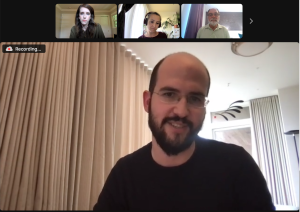Join us for a conversation with Orsolya Vincze, research fellow at the Centre for Ecological Research, Hungary, Mathieu Giraudeau, researcher at Littoral, Environnement et Sociétés (LIENSs) at CNRS-La Rochelle Université, and Alex Cagan, staff scientist in the Dept. for Cancer, Ageing and Somatic Mutation at the Wellcome Sanger Institute.
The DNA in the cells in our body accumulate mutations as we age, and these mutations are known to cause cancer and may contribute to the ageing process. Many people associate cancer with human pathologies, but it is now clear that this disease can develop in all multicellular organisms, although their prevalence varies considerably between species. Nevertheless, we know very little about how these processes operate across species, the extent to which various vertebrate animals are susceptible to cancer, and what species traits influence cancer susceptibility. Vincze and Giraudeau discussed the results of their recent analyses, that reveal key evolutionary trajectories of cancer risk across the mammalian phylogeny. They showed major differences in cancer predisposition among mammalian orders and strong associations of cancer vulnerability with diet. Cagan then presented his research, which studied age related mutational processes in 16 mammalian species with diverse lifespans and body-sizes to understand more about the role of mutation in cancer and ageing. These studies provide a thorough assessment of one of the biggest mysteries in cancer biology, namely Peto’s paradox, and illustrate the key role of life-history evolution in shaping cancer resistance.



Resources discussed:
- Vincze et al. 2022, “Cancer risk across mammals”
- Cagan et al. 2022, “Somatic mutation rates scale with lifespan across mammals”
- Gorelick and Naxerova 2022 Nature News and Views article, “Mutational clocks tick differently across species”

Comments are closed, but trackbacks and pingbacks are open.